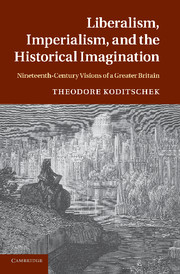 Liberalism, Imperialism, and the Historical Imagination
Liberalism, Imperialism, and the Historical Imagination Book contents
- Frontmatter
- Contents
- Acknowledgements
- List of abbreviations
- Introduction
- 1 Imagining Great Britain: Union, Empire, and the burden of history, 1800–1830
- 2 Imagining a British India: history and the reconstruction of Empire
- 3 Imagining a Greater Britain: the Macaulays and the liberal romance of Empire
- 4 Re-imagining a Greater Britain: J. A. Froude: counter-romance and controversy
- 5 Greater Britain and the “lesser breeds”: liberalism, race, and evolutionary history
- 6 Indian liberals and Greater Britain: the search for union through history
- Epilogue: From liberal imperialism to Conservative Unionism: losing the thread of progress in history
- Index
- References
6 - Indian liberals and Greater Britain: the search for union through history
Published online by Cambridge University Press: 04 April 2011
- Frontmatter
- Contents
- Acknowledgements
- List of abbreviations
- Introduction
- 1 Imagining Great Britain: Union, Empire, and the burden of history, 1800–1830
- 2 Imagining a British India: history and the reconstruction of Empire
- 3 Imagining a Greater Britain: the Macaulays and the liberal romance of Empire
- 4 Re-imagining a Greater Britain: J. A. Froude: counter-romance and controversy
- 5 Greater Britain and the “lesser breeds”: liberalism, race, and evolutionary history
- 6 Indian liberals and Greater Britain: the search for union through history
- Epilogue: From liberal imperialism to Conservative Unionism: losing the thread of progress in history
- Index
- References
Summary
The mutual intercourse of England and India, political as well as social, is destined to promote the true interests and glory of both nations … For greater will be our rejoicing when all the chiefs and people of India shall be united with the English nation in a vast International assemblage, before the throne of the King of Kings, and the Lord of Lords.
Keshub Chandra Sen, Delhi, 1877, quoted in MLS, 284Rightly or wrongly, for good or evil, Englishmen and Indians have been knit together, and it behooves both races so to mould themselves as to leave a splendid legacy to generations yet to be born, and to show that though Empires have gone and fallen this Empire may perhaps be an exception and that this Empire is not founded on material but spiritual foundations.
M. K. Gandhi, Cape Town, 1914, in The Collected Works of Mahatma Gandhi, XII (New Delhi, 1964), 505On the evening of February 13, 1866, the President of the London Ethnological Society, John Crawfurd, addressed its assembled members, arguing that European races were superior to those of Asia in almost every respect. Exactly five weeks later, Dadabhai Naoroji, a Parsi merchant from Bombay, stood before the same body to deliver a paper refuting Crawfurd's claims. Unintimidated by the glittering array of brilliant scientific minds in front of him – probably including Thomas Huxley, Francis Galton, Sir John Lubbock, Sir Roderick Murchison, and many others – Naoroji ripped Crawfurd's tendentious confection into hopeless shreds.
- Type
- Chapter
- Information
- Liberalism, Imperialism, and the Historical ImaginationNineteenth-Century Visions of a Greater Britain, pp. 263 - 313Publisher: Cambridge University PressPrint publication year: 2011


